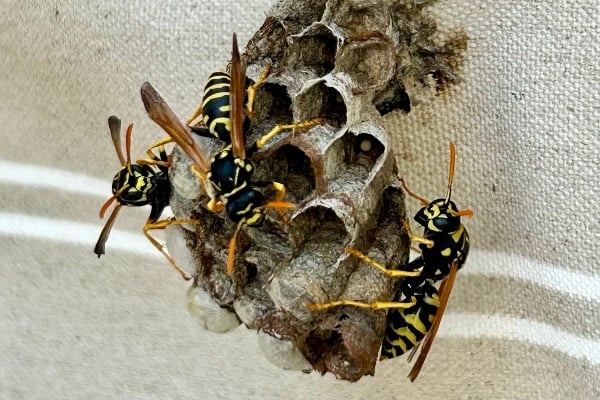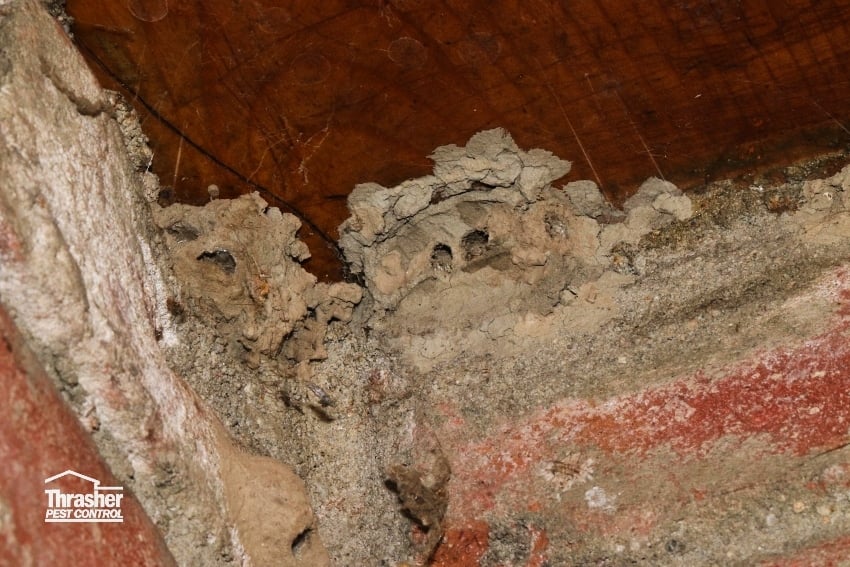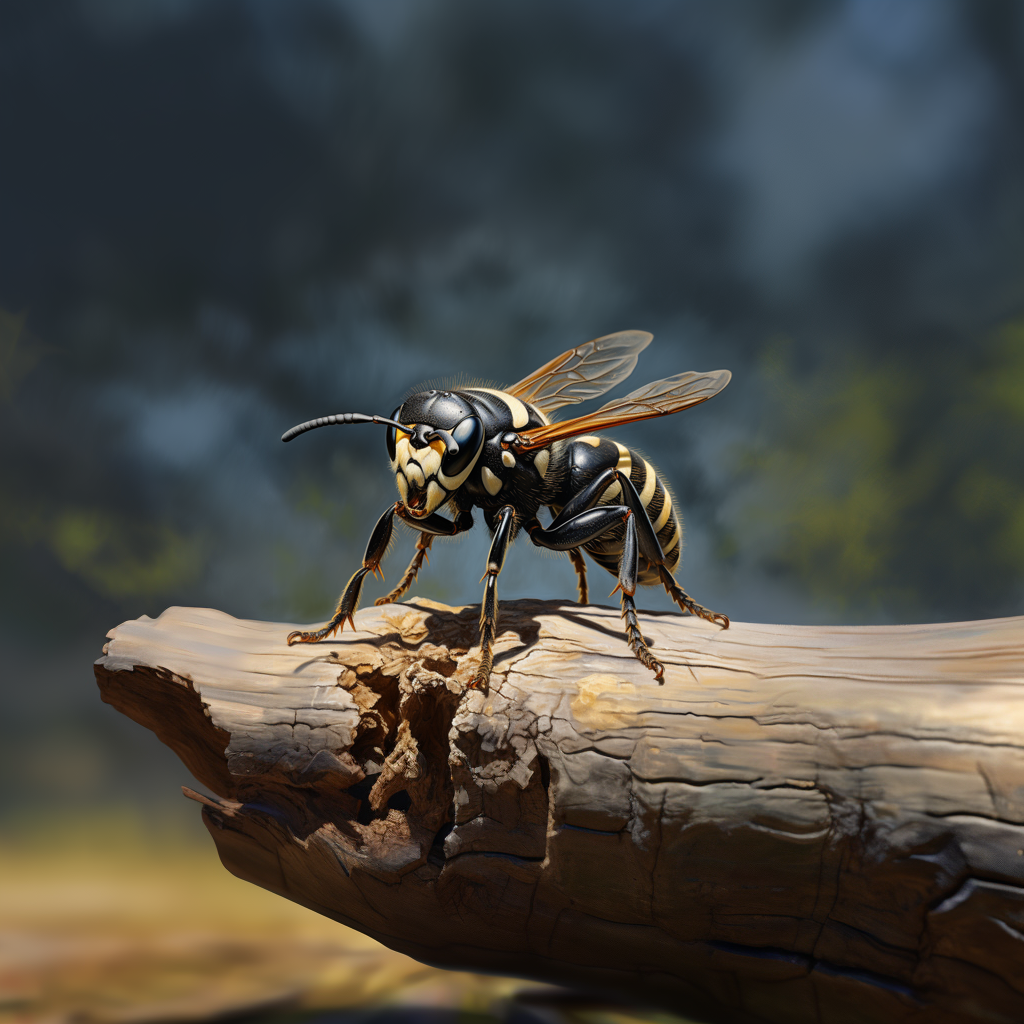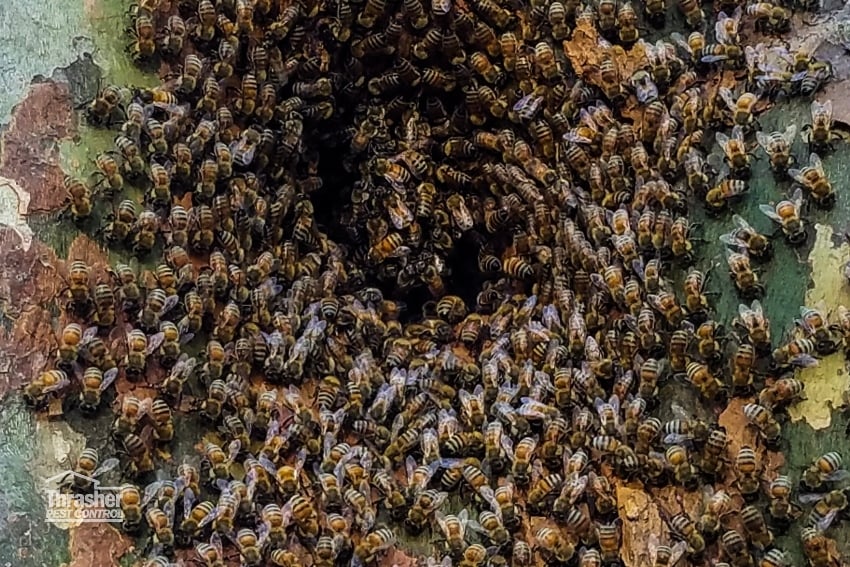
Wasp Control, Hornet Control, Yellowjacket Control in San Diego
With our warm climate and beautiful landscape, San Diego is a paradise for residents and tourists alike but our outdoor spaces can quickly turn unpleasant when stinging insects are buzzing us and our food. Wasps, yellowjackets, and hornets are common in San Diego County. They nest in the ground, on eaves, on patio furniture, and in trees. Yellowjacket wasps are especially aggressive and dangerous to deal with on your own. We have the training and protective equipment to safely provide wasp control service.
More Wasps in San Diego
Paperwasps
Paperwasps are identified by their papery-looking nests in shrubbery, under eaves, around doors, on patio umbrellas, and even in the hatchback area of cars. Usually docile, these wasps will attack when their nests are threatened. Most stings happen when a gardener accidentally disturbs a nest or a when someone attempts DIY wasp control and knocks down nests without protective gear.

Mud Daubers
Mud daubers, also known as mud wasps, are a type of solitary wasp found in San Diego. Mud daubers construct cylindrical nests made of mud, which they attach to structures such as walls, eaves, or even tree branches. Unlike social wasps, mud daubers are not aggressive and rarely sting humans unless directly threatened. They are beneficial predators, feeding on spiders and other small insects.

Bald Faced Hornets
Bald-faced hornets inhabit various regions of North America, including San Diego, where their distinctive appearance and behavior make them a notable presence. Recognizable by their contrasting black and white coloration, these aerial wasps construct intricate paper nests in trees, shrubs, and sometimes on structures.
While they contribute to ecosystem balance by preying on other insects, their aggressive defense of their nests can pose challenges in urban and suburban areas. Due to the potential risks associated with stings, especially for those with allergies, it's recommended to exercise caution around their nests and seek professional assistance with wasp nest removal.

Bees
Bees play a vital role in San Diego-- contributing to pollination that supports the growth of various plants and agricultural crops. From the iconic honeybee to native solitary bee species, these pollinators help sustain the local environment and food production. While solitary bees are generally beneficial and docile, honeybees are beneficial AND can be aggressive. They will sting if necessary to protect the hive or each other. Individuals with allergies are advised to be very cautious around all bee species. Read More about Bees: Bee Control

FAQ about Stinging Insect Control
1. Why is stinging insect control important?
Stinging insects like wasps, bees, and hornets can pose significant threats to human health and safety. Their stings may cause allergic reactions ranging from mild irritation to severe anaphylactic shock, which can be life-threatening for some individuals. Moreover, when stinging insects establish nests near homes or buildings the potention for stings increase.
2. Can I handle stinging insect control on my own?
Dealing with stinging insects can be dangerous and is best left to professionals. Untrained individuals attempting to remove nests or eliminate stinging insects themselves could provoke aggressive behavior and increase the risk of stings. Professionals have the right equipment, knowledge, and experience to handle these situations safely and effectively.
3. What are the risks of stinging insect stings?
Stinging insect stings can cause a range of reactions, from localized pain, swelling, and itching to severe allergic reactions that may lead to anaphylaxis. Anaphylaxis is a serious, potentially life-threatening allergic reaction that requires immediate medical attention. Those with known allergies to insect stings are at a higher risk, and stings around sensitive areas like the mouth, nose, or throat can be particularly dangerous.
4. How does a pest control service get rid of stinging insects?
Thrasher starts with a quality inspection to identify the type of stinging insect. After the inspection, our expert Thrasher pest technicians match the treatment to the insect: bees, wasps, or hornets. They then followup to ensure the colony has been controlled.
5. How quickly can stinging insect control professionals respond to an infestation?
Quickly! Because of the danger to people, we make stinging insect treatment a high priority. Our response time can vary depending on the time of year. The best way to find out our availability is to give us a call or send in a contact form and one of our representatives will be in touch.
6. Who Do I Call for Wasp Stinging Insect Control?
That's easy. Thrasher Pest Control.






